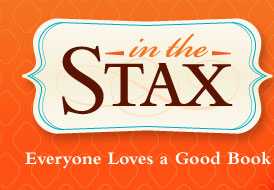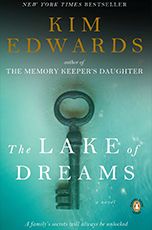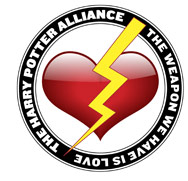
The Harry Potter Alliance turns the lessons learned from series into real world action.
The debut of the final film Harry Potter and the Deathly Hallows: Part 2 in theaters early this morning signifies a new chapter for the Harry Potter generation. Rather than an end, fans like Harry Potter Alliance Executive Director Andrew Slack, see the release of the eighth movie as a new beginning, an opportunity to turn the lessons learned from Harry Potter into action. In an article for the CNN website Slack writes of the gifts that JK Rowling’s creations have given to millions of readers. “Reality is mysterious. And the reality is that a fantasy book aimed at children has forever changed writing, publishing, literature, music, sports, social media and social activism.” Read more…
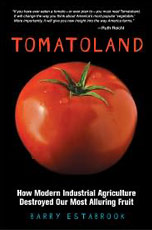 Former Gourmet magazine writer Barry Estabrook provides answers to anyone wondering why today’s supermarket tomatoes taste so bland in his new book Tomatoland: How Modern Industrial Agriculture Destroyed Our Most Alluring Fruit (Andrews McMeel Publishing, 240pgs). The author explores tomato farming in South Florida, where the majority of U.S. tomatoes are grown in the winter months. On the surface Florida’s sandy, nutrient poor soil seems an odd choice to grow the red fruit, but the state’s warm winter weather allows the plants to grow in the off season, and farmers compensate by saturating the earth with dozens of pesticides, herbicides and chemical fertilizers. Growers strive to create a uniformly shaped tomato that is hardy enough to survive transport across the country. The actual taste of the produce is no longer a factor, and even the color is not naturally achieved. Green tomatoes are gassed with ethylene to achieve their dull orange-red color. Read more…
Former Gourmet magazine writer Barry Estabrook provides answers to anyone wondering why today’s supermarket tomatoes taste so bland in his new book Tomatoland: How Modern Industrial Agriculture Destroyed Our Most Alluring Fruit (Andrews McMeel Publishing, 240pgs). The author explores tomato farming in South Florida, where the majority of U.S. tomatoes are grown in the winter months. On the surface Florida’s sandy, nutrient poor soil seems an odd choice to grow the red fruit, but the state’s warm winter weather allows the plants to grow in the off season, and farmers compensate by saturating the earth with dozens of pesticides, herbicides and chemical fertilizers. Growers strive to create a uniformly shaped tomato that is hardy enough to survive transport across the country. The actual taste of the produce is no longer a factor, and even the color is not naturally achieved. Green tomatoes are gassed with ethylene to achieve their dull orange-red color. Read more…
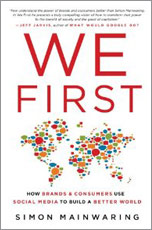 By Simon Mainwaring
By Simon Mainwaring
Palgrave Macmillan | 256pgs
Release Date: June 7, 2011
Summary:
Simon Mainwaring, a branding and social media expert who has worked with the world’s most influential corporations, proposes a new business paradigm in We First: How Brands and Consumers Use Social Media to Build a Better World. He envisions a world where companies leverage social media not only for profit, but for the improvement of the community as well. Mainwaring contends the “Me First” corporate greed mentality is unsustainable and harmful to society. Instead, the book offers an alternative to corporations and consumers, where decisions in the production and purchase of goods are made for the benefit of greater good. The idea of “contributory consumption” is introduced, where each commercial interaction contributes to the betterment of the environment, and the world at large. Case studies from global giants such as Pepsi, Toyota and Nike are used to show how new strategies can achieve success. Read more…
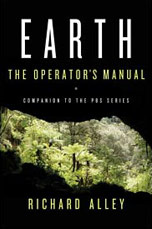 To coincide with Earth Month, Penn State University Geology professor Richard Alley has released the book Earth: The Operators’ Manual (W. W. Norton & Company, 479pgs) as a companion the the two-part PBS special of the same name that aired earlier in April. The author, who also hosts the television program, addresses the issues of climate change and renewable energy in an engaging, interesting way, and uses scientific research to dispel the myths propagated by those who deny global warming. Outlining man’s reliance on fuel throughout history, the Nobel Peace Prize winner utilizes scientific findings to show how our current hyper-consumption of fossil fuels is harming the environment and contributing to the greenhouse effect. Though tackling a serious subject, Alley, A former member of the UN climate change committee keeps the tone optimistic by suggesting solutions to the climate change problem using alternative energy sources like solar, geothermal and wind. He feels that today’s technology makes tapping into these resources a feasible option in healing the environment, and will thus stimulate economic growth and create a significant number of new jobs. Read more…
To coincide with Earth Month, Penn State University Geology professor Richard Alley has released the book Earth: The Operators’ Manual (W. W. Norton & Company, 479pgs) as a companion the the two-part PBS special of the same name that aired earlier in April. The author, who also hosts the television program, addresses the issues of climate change and renewable energy in an engaging, interesting way, and uses scientific research to dispel the myths propagated by those who deny global warming. Outlining man’s reliance on fuel throughout history, the Nobel Peace Prize winner utilizes scientific findings to show how our current hyper-consumption of fossil fuels is harming the environment and contributing to the greenhouse effect. Though tackling a serious subject, Alley, A former member of the UN climate change committee keeps the tone optimistic by suggesting solutions to the climate change problem using alternative energy sources like solar, geothermal and wind. He feels that today’s technology makes tapping into these resources a feasible option in healing the environment, and will thus stimulate economic growth and create a significant number of new jobs. Read more…
Categories: Children's Book, New Release, Non-Fiction Tags: climate change, Dr. Seuss, Earth Month, Earth: The Operators' Manual, environment, environmental health, global warming, renewable energy, Richard Alley, The Lorax
 Freelance journalist Jonathan Bloom is on a mission. With his book American Wasteland: How America Throws Away Nearly Half of Its Food (and What We Can Do About It), he hopes to educate people and open their eyes to the way the average American household carelessly manages food waste. In a world where innumerable people go hungry, even millions here in the U.S., it is a travesty that almost half of American crops end up in landfills. The tons of rotting food release methane gas into the atmosphere, thus harming the environment by contributing to the greenhouse effect. Through meticulous research and field-work, Bloom follows the food cycle from farms to the kitchen trash can, and documents the waste that goes on at all levels. A review in The Seattle Times calls the journalist “a fanatic against food waste”, and it is this fanaticism that drives him to study the economic and moral issues of how we as a nation treat our food, and come up with innovative solutions to the problem. Read more…
Freelance journalist Jonathan Bloom is on a mission. With his book American Wasteland: How America Throws Away Nearly Half of Its Food (and What We Can Do About It), he hopes to educate people and open their eyes to the way the average American household carelessly manages food waste. In a world where innumerable people go hungry, even millions here in the U.S., it is a travesty that almost half of American crops end up in landfills. The tons of rotting food release methane gas into the atmosphere, thus harming the environment by contributing to the greenhouse effect. Through meticulous research and field-work, Bloom follows the food cycle from farms to the kitchen trash can, and documents the waste that goes on at all levels. A review in The Seattle Times calls the journalist “a fanatic against food waste”, and it is this fanaticism that drives him to study the economic and moral issues of how we as a nation treat our food, and come up with innovative solutions to the problem. Read more…
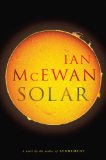 By Ian McEwan
By Ian McEwan
Nan A. Talese | 304pgs
Release Date: March 30, 2010
Nobel prize–winning physicist, Michael Beard is skating by on his celebrity and little else, as Ian McEwan’s Solar opens. His exorbitant public speaking fees and regular paychecks from his post at Britian’s National Centre for Renewable Energy, give him plenty of time and resources to over-indulge in food, drink and women. In Part One of the book, Beard’s voracious appetites and infidelities have ruined his personal relationships, and caused his professional life to stagnate. In Part Two, the physicist attempts to jump start his career by passing off a dead colleague’s research as his own, and gains sponsorship to study climate change in New Mexico. Because Beard comes by his fresh start in the U.S. dishonestly, he decides to work on mending his deceitful ways. Part Three has him striving to save the environment from Global Warming and himself from a life of debauchery.
Read more…
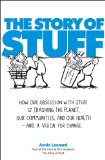 By Annie Leonard
By Annie Leonard
Free Press | 352pgs
Release Date: March 9, 2010
Environmentalist Annie Leonard continues the conversation on over-consumption started in her internet documentary The Story of Stuff in her new book The Story of Stuff: How Our Obsession with Stuff Is Trashing the Planet, Our Communities, and Our Health-and a Vision for Change. Expanding on the material in the film, Leonard discusses the five stages of consumer goods: extraction, production, distribution, consumption, and disposal, and how these stages are damaging the environment and lowering the quality of life. Through in-depth research and first hand experience visiting landfills and factories throughout the world, the author illustrates how natural resources are being depleted and how the toxic by-products of manufacturing material goods are ruining people’s health. The never-ending quest for more “stuff” forces many people to work more, enjoy life less, and fill garbage pits with discarded junk. In the face of this consumption crisis, Leonard suggests a shift in societal values towards emotional well-being, rather than material gain, re-adjusting the work-life balance, and introducing strict legislation world-wide to stop the environmental erosion.
Read more…
